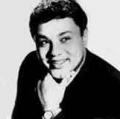A short summary on Big Dee Irwin’s career
Big Dee Irwin (born DiFosco T. Ervin Jr. in 1932 in Harlem, New York; some sources otherwise state as DeFosca Erwin) was an American singer and songwriter whose claim to prominence came first as a lead singer and founder of a vocal group The Pastels in 1954, and then as a solo artist with “Swinging On A Star” (a duet with Little Eva) in 1963. Ervin led a vocal group called the Pastels in the mid-1950s while he was stationed in Greenland as a US Air Force officer. Upon returning to the US, the Pastel released a single titled “Been So Long”, written by Ervin himself. From a regional hit, it grew into a Top 40 pop smash at #24, and #4 on the R&B singles chart in 1958. But following disappointing singles led the group into disbandment in 1959. By then Ervin started a solo career under the stage name Dee Erwin. He changed it into Big Dee Irwin by the time Ervin signed for Dimension Records. During the 60s music scene he tasted some fame again by a single called “Swinging On A Star”, in which he duetted with Little Eva. It broke into the US Top 40; however, it went bigger in the UK (at #7) that led him to embark on a nine-month tour there. After that, his following singles (including “Happy Being Fat”, which he sang again with little Eva) failed to chart. He also collaborated with Ray Charles, Bobby Womack and other musicians. Heart failure took his life in 1995, aged 69. More on Big Dee Irwin in this article
Early life and singing career with the Pastels
American singer-songwriter Big Dee Irwin was born Difosco Ervin (sometimes spelled born Defosca Erwin) in Harlem, NY on July 6, 1932. In 1954, Ervin formed the group The Pastels along with three other youngsters Jimmy Willingham (baritone), Richard Travis (first tenor) and Tony Thomas (second tenor). All of them were members of the US Air Force.
The singing group started performing at night clubs, where the majority of audience being fellow servicemen. They also participated in Air Focre talent shows as well on the national show Tops In Blue. Gaining good and encouraging response for their act at the Annual Air Force competition, several recording labels came knocking at their door.
Eventually, the Pastels chose to sign with Hull Records in New York. Their first single “Been So Long” (written by Ervin) was recorded, and eventually released on the subsidiary label Mascot before being leased to Chess Records, who in turn released the single on their own subsidiary imprint Argo. At the same time, Ervin was discharged in 1958 as his other band mates were also about to leave the Air Force.
“Been So Long” peaked at #4 on the Billboard R&B chart . The Pastels became in-demand performers at that time. They started touring around America and did several shows along with the big names such as Buddy Holly & The Crickets, Jerry Lee Lewis, Chuck Berry, Larry Williams, Frankie Lymon and Screamin Jay Hawkins. In April 1958, the follow-up record “You Don’t Love Me Anymore” was released but failed to duplicate the success of their first single. Later in 1958 The Pastel came back to Apollo Theater to play a series of shows but in the following year, The Pastels fell apart.
Big Dee Irwin going solo
Ervin pursued a solo career almost immediately after the Pastel’s disbandment. First, he changed his stage name into Dee Erwin when he signed a contract with Hull Records. But later, he later changed his stage name again, this time into Big Dee Irwin after signing a record contract with Dimension Records.
Big Dee Irwin’s biggest hit “Swinging on a Star”
In 1963 Irwin recorded the 1944 Crosby original “Swinging On A Star” (along with rising star Little Eva). Released on Dimension, the song charted on the Top 40 pop charts at #38. But it became an even bigger hit in the United Kingdom at #7, prompting Irwin to embark on a nine-month tour there.
Later life and career
Again with Little Eva, the next single “Happy Being Fat” did not become a hit and most of the follow-up singles as well. However, Irvin continued to work as a songwriter for Ray Charles, Bobby Womack and The Hollies (who included Irvin’s “Kind Of Boy” on their first full length record). In 1976, he came back with a new alias with DiFosco and released the danceable single “Face To Face.” Irwin released his last record and retired from the music industry in 1978. In August 27, 1995, Irwin died of heart failure. He was 63.

